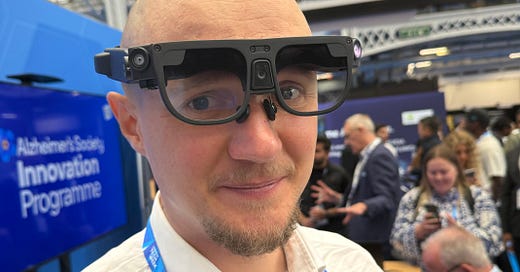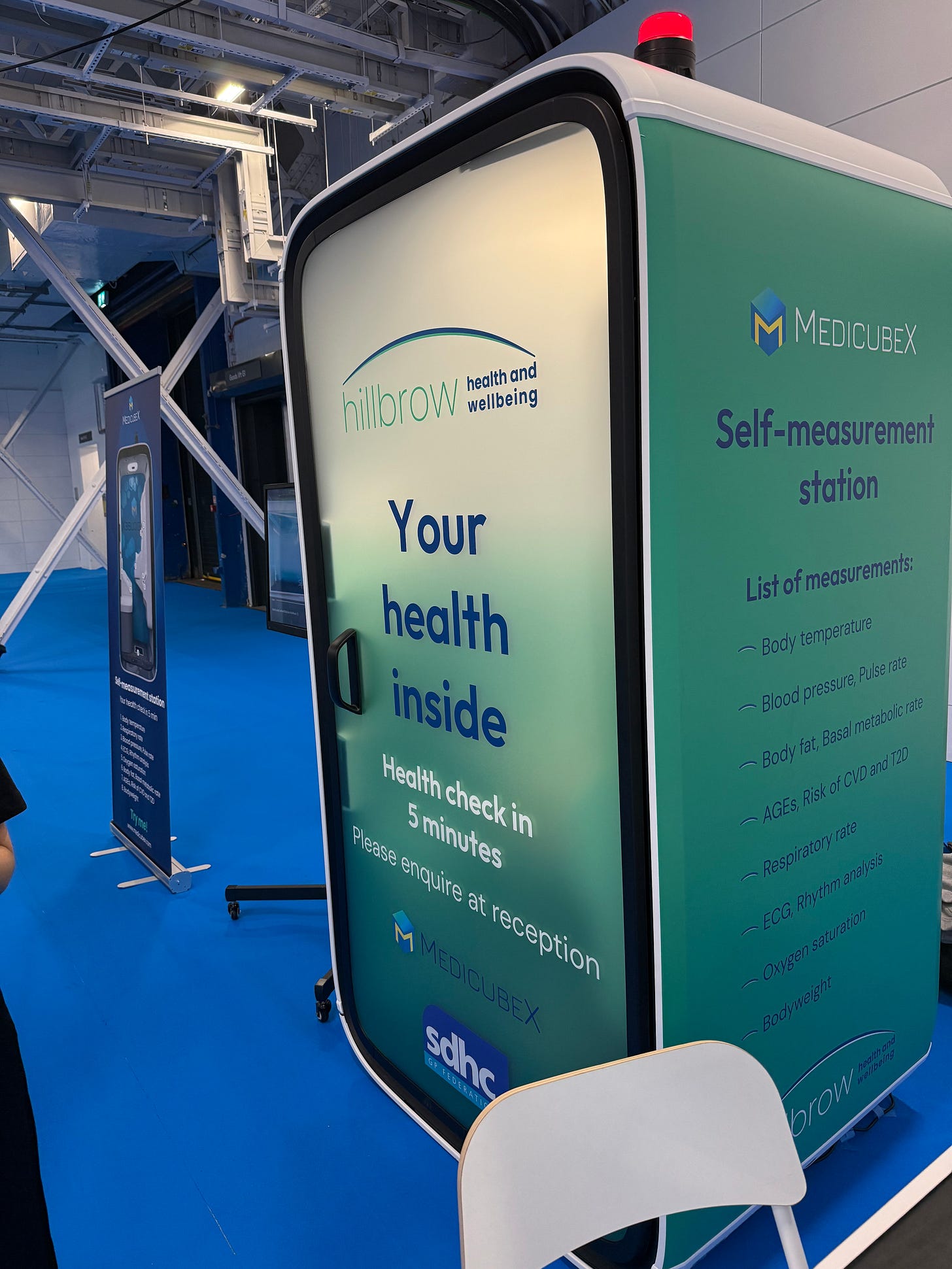Ten minutes into London Tech Week, my first big tech event for a while, and I had had enough. I had arrived at Olympia slightly under-medicated, having only just taken my latest tablet. It was hot, noisy and crowded and the connectivity was as bad or even worse than is customary at such events. (Not for the first time, I looked back with embarrassment on my 2019 reporting of the arrival of 5G which, I told BBC audiences, would sort out those network capacity problems we all experienced in busy locations. Sorry….)
My badge told me that the London Tech Week app would answer all my questions but after an interminable wait for it to download the front page did not appear to include a map or a search button. But after wandering aimlessly around the cavernous halls I finally came across what had brought me here, the Alzheimer’s Society stand, and instantly everything seemed better.
Many visitors to a tech show might be surprised to find a dementia charity there or at least just assume thats it was on a fundraising mission. But as the Alzheimer’s Society’s head of innovation Simon Lord explained to me, after sitting me down with a glass of water,they were there because they are becoming important funders of health technology:
“In the last year, we've really scaled up the amount of support that we are delivering to entrepreneurs and startups. Dementia devastates lives. Innovation can transform them.”
Among their initiatives is an accelerator programme that invests in the best ideas that can transform the lives of people living with dementia and a cohort of innovators which they fund through the NHS Clinical Entrepreneur programme. But it is the Longitude Prize on Dementia, which I wrote about here when it launched in 2022, which has proved the real draw for innovators.
The finalists battling for a £1 million prize for the best idea that can help people with early stage dementia to live independently for longer have now been announced. I met one of them on the stand, trying in a very noisy environment to demonstrate a set of augmented reality glasses that depend on speech commands from the user.
Szczepan Orlins of London-based Animorph put the CrossSense glasses on me and explained how they labelled key objects in the user’s environment, with an AI chatbot on hand to answer questions."An AI assistant serves as an interface that pulls all this information together to build a portrait of your environment, of how you are feeling, what are your cognitive needs, and through this we can provide tailored support.”
As ever, I was impressed by the patience and determination needed to keep this kind of research going on the long and uncertain road to commercialisation. Szczepan said he and his colleagues had come up with the original idea in 2016 – a lifetime away in terms of the development of AI - then had to do other work with virtual and augmented reality projects to fund themselves for a while. Now they are back full-time just concentrating on refining the prototype of their CrossSense product.
The other UK-based Longitude Prize finalist had been on the stand on Monday with a product designed to allow a relative to monitor a person living at home without an excessive invasion of thier privacy. SensS2 is a 4G-connected box that sits in the home -no cameras, no microphones, no wearables - and provides an early warning of any change in the routine of a loved one living with dementia.
A range of other technologies not competing for the Longitude Prize have been featured on the Alzheimer’s Society stand. Virtual and augmented reality seems to be back in a big way, not just serving as a navigation tool for people with dementia but helping carers to experience what they are going through and so have greater empathy.
Of course, along with this work to improve the lives of people living with dementia the Alzheimer’s Society is helping fund research into a cure and I asked Simon Lord whether it was tricky to balance the two demands on its cash. He said this was a very exciting time for pharmaceutical research with 138 drugs currently undergoing clinical trials and the first two disease modifying drugs, donanemab and lecanemab, on the market but the subject of great controversy over their cost and effectiveness.
But he said that was the hope for tomorrow. His team’s job was to focus on hope for today:
“So how do we get more people the scans they need to get a kind of early and accurate diagnosis? How do we support the delivery of treatments when they come online? And how do we support people to live independently for longer, to be hospitalised less frequently, which can be very dangerous for people living with dementia, if they are in a new environment suddenly, and can often precipitate a decline in the condition? There is a huge swathe of things that need to be improved because dementia touches every aspect of someone's life.”
I came away from the Alzheimer’s stand invigorated by hearing these examples of where technology, and in particular AI, could improve healthcare and determined to find more. But all I came across was MEDICUBEX, a box promising “a health check in five minutes.” There was a half hour queue to give it a go and in any case I did not need a health check to tell me I was a bit knackered because I had an incurable degenerative disease. So I went home…





Not at all surprised you were knackered; even with good health this sort of event is really tiring. Well done for staying as long as you did and reporting on what is upcoming. I was fascinated by the Sens2 and could not help but wonder how it obtained any feedback without cameras and sensors. Was there a part worn by the person with dementia that was somehow providing this feedback?
Very interesting indeed, Rory. Thanks for reporting back for us. You must have been shattered!